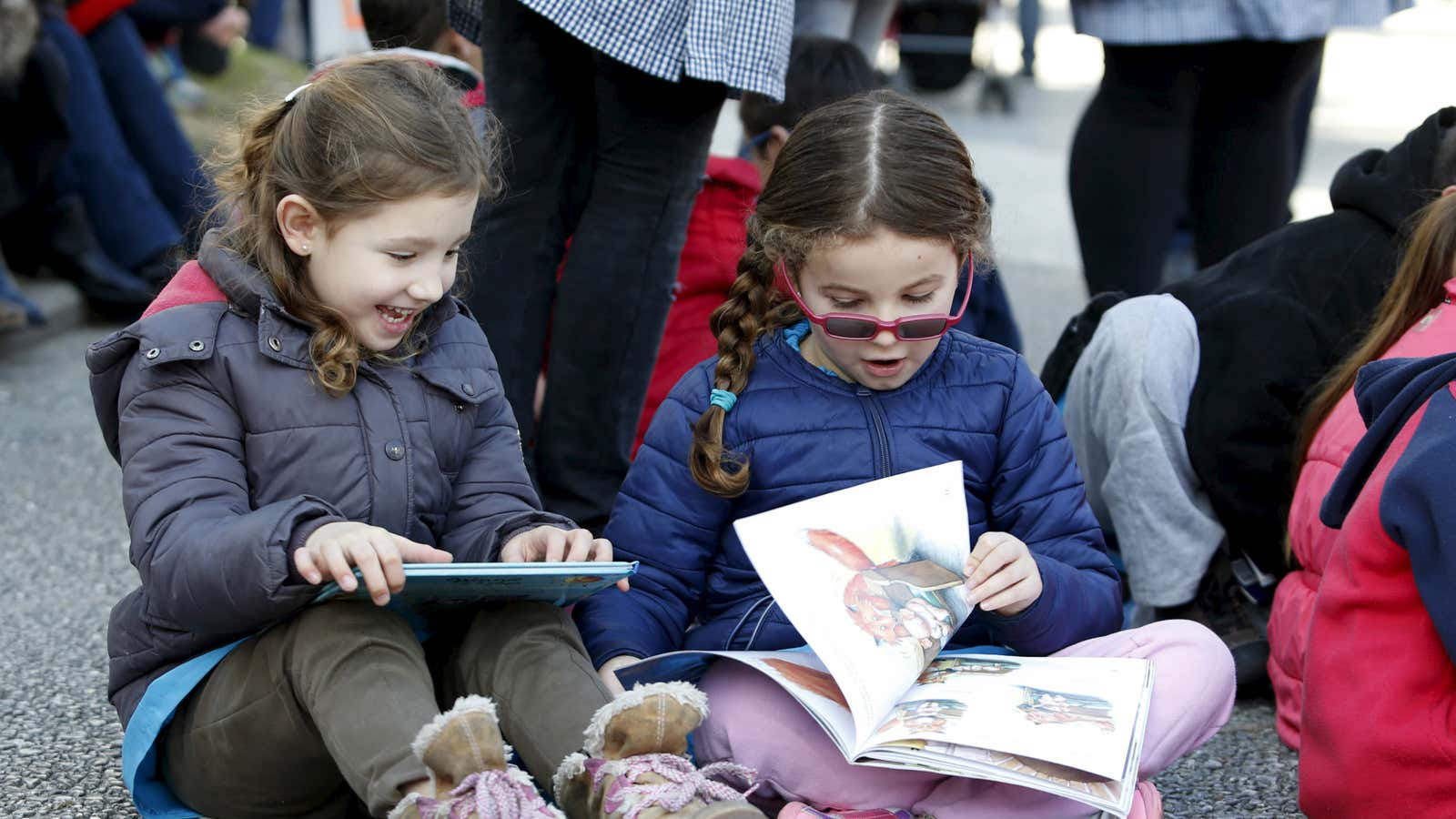In his 2015 book Raising Kids Who Read, University of Virginia psychology professor Daniel Willingham explains the concept of “virtuous cycle” of reading. Children who read well tend to enjoy reading; because they enjoy reading, they read more; because they read more, they become better readers.
But how do you generate literary enthusiasm among kids who are not in the virtuous cycle—those who struggle with reading, or who’d simply prefer to play outside rather than curl up with a book? Willingham and DM Crosby, a deputy headteacher at a primary school in Nottinghamshire, England, have some suggestions.
Put books in unexpected places
Willingham suggests that parents looking to encourage reading look out for environments that are “impoverished”—that, places where kids might be a bit bored—and fill those spaces up with books. Think bathrooms and cars. “My wife’s a teacher,” Willingham tells Minnesota Public Radio (MPR), “and she tells parents all the time: Put books in your child’s bathroom. And it’s amazing how much kids will read when there are books in the bathroom.”
Create environments that welcome reading
Another move, according to Willingham, is to impoverish the environments that are already crowded with plenty of other distractions. That means taking away phones and tablets to create the time and space to read. “Restricting screen time is an obvious version of that,” Willingham says.
Carving out reading-specific nooks also helps. Take a bunch of throw pillows, put them in a corner with a lamp, and dub it a reading corner. So does instating a reading ritual: Find a time of day that is conducive to family reading time, maybe after dinner and before TV, or right before bed.
Read in front of your kids
If kids see adults reading themselves, they’ll be more encouraged to pick up a book. Crosby recommends that parents talk to children ”about what you are reading and read in front of them; you could be the only person they ever see doing this.” Willingham also tells MPR that he urges his kids to read not because science says it will make them smarter and help them earn more down the line, but because it is simply a good family value:
“You should model reading, make reading pleasurable, read aloud to your kid in situations that are warm and create positive associations. But also setting a tone where our family is one where we like to learn new things. We like to learn about the world, and a big part of that is reading.”
Data backs up this suggestion: according to Scholastic, the four most powerful predictors of reading frequency for children between the ages of 6–17 are a strong belief that reading for fun is important; really enjoying reading; having parents that are engaged and involved in reading with children; and having parents who are frequent readers themselves.
Help kids love reading for its own sake
Many parents—in a moment of desperation or creativity—may consider financial incentives or other “rewards” to get their kids to make it through the summer reading list or the school year itself. This can be a minefield, Willingham argues: Paying your kid $5 in exchange for getting through a book creates an extrinsic reward, rather than encouraging intrinsic motivation.
“When you offer kids rewards, there’s the potential for them to think, “The reason I read is because I’m offered a reward.” Therefore, what’s going to happen when you eventually stop the reward? The child is going to figure, “There’s not really any point to reading. I wasn’t reading because I liked it. I was only reading to access the reward.”
Read with your kids
If all else fails, jump into books with them. Offer to read the first few chapters together out loud to help kids get started, or as DM Crosby suggests in a post for teachers, create”book teasers”:
Share the first few chapters of a book with your class. Ham up the performance, get them hooked and then stop; hold a lottery to see who gets to take a copy home that night. If you read it with them, you can discuss it.
Parents may not be able to create the competitive tension of a classroom, but sometimes, tackling the first few chapters of a book and talking through it helps kids feel more confident they can get through the rest of the book solo. (This is especially true of long books, which can seem intimidating.) Reading together also allows you to check to see what kids understand and help with vocabulary.
Encourage your kids to try new genres and harder books
And when you finish the summer reading, you can use all those good habits to help kids keep diving deeper into the library stacks. Doug Lemov, author of Teach like a Champion and co-author of Reading Reconsidered, argues that it’s important to let kids pick the books they love, but also encourages parents to read them texts above kids’ current level. He writes:
Yes, encourage your kids to practice decoding and fluency on accessible texts. But also realize that being read to from books that are more complex than they can read on their own prepares them for the gatekeeper task: understanding difficult ideas and complex texts.
